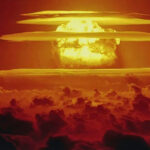by Fabio Bozzo
The eternal struggle between secular thought and religious thought
The battle between civilization based on atheism and agnosticism, on the one hand, and civilization based on religious, fideistic and transcendental values, on the other, is a battle that embodies the very identity of the West.
This clash-encounter began in ancient Greece, the cradle and origin of Western Civilization. In that space-time context, a culture with strong religious values, transmuted from the pagan Olympic pantheon, was mature enough to create the classical philosophy that de facto created the way of conceiving the world still valid today in the West. This did not erase the faith in the Gods, but brought to it a logical thought that, depending on the point of view, completed or strengthened it.
After the birth of Greek philosophical and scientific thought, the history of the West has been marked by alternating phases, in which usually a period of agnostic-scientific predominance was followed by one marked by the supremacy of religious faith. The last of these phases, the one we are still living through, began with the Industrial Revolution of the first half of the nineteenth century.
Since then, Europe, the non-European countries inhabited by children of the Old Continent and those few nations that have successfully westernized (Japan in primis) have experienced a human development never seen before in human history. This progress has involved, in particular, science, political doctrines (many of which have been "salvaged" from the vestigial theories of ancient Greece) and everything that could contribute to improving well-being. In summary, from about 1815 to the present day, the West has developed its material sphere in an extraordinary way.
This has put the religious element of our civilization, essentially Christianity, in objective difficulty. On the one hand, secular institutions have greatly reduced the weight of the Churches in the management of public affairs (and in too many cases they have allowed themselves to be gratuitously persecuted), on the other hand, the progressive material well-being of the majority of people has meant that they no longer need spiritual support for the hardships of life. If we add to this the fact that scientific discoveries almost always go to refute the sacred texts of religions (and Christianity is no exception), in an era in which the majority of Westerners are more willing to follow science than religion, the result is: more and more empty churches, widespread and limited anti-clericalism and the spread of agnosticism and atheism.
Of course, the fact that the (momentary?) victory of science over faith has fostered democracy, as well as lengthened and improved our lives, does not mean that the decay of religious identity has had only positive consequences. Religion has always been also and not only an organ of control of human passions/pulsions. An organ used, for better or for worse, by all political regimes, with the exception of those that are openly anti-religious. Therefore, the lack of a "spiritual sentinel", which less prosaically we could call lack of fear of going to hell after death, has not had a good effect on society. That's because, even where secular laws and institutions work best, human beings live with the inscrutability of the afterlife. Inevitably, the absence of a set of moral stakes of spiritual origin means greater social laxity.
The current geopolitical weight of religion
After this necessary introduction we turn to a geopolitical view of the "God Power" in the world.
The West, as usual, in the last two hundred years has completely decontextualized the histories, cultures and ethnicities not only of its own, but also of the non-Western world. This mistake has often convinced us that our progress should, by osmosis, change the lifestyle and beliefs of peoples who not infrequently still believe that the Earth is flat or something similar. Drunk on rationalist positivism and atheistic materialist socialism (as well as justifiably proud of having walked on the moon and invented antibiotics) the white man for a while believed that the weight of religion in human affairs was destined to be eternally vestigial.
Certainly there have been exceptions. For example, the American Frank Herbert (1920-1986), in his cycle of novels "Dune", from which they were taken a controversial masterpiece film and subsequent sequels, imagined a universe in which society and the entire system of life revolve around a monotheistic religion openly inspired by the triad Judaism-Christianity-Islam. But these are, as mentioned, exceptions: after the Second World War, it seemed to most that religion was on its way to social disappearance.
It would be Islam to sound the alarm, with an event apparently catapulted from a bygone era: the Iranian Islamic revolution of 1979. In the midst of the materialistic era, a country, in some respects among the most evolved in the Muslim world, overthrew a secular government and put a fanatical preacher with the religious title of Āyatollāh in power. Since then, history has run fast: collapse of intolerant atheist communism, almost always violent religious revival throughout the Islamic world, and conflicts in which faith has been a key element, for example the Bosnian War.
What about today? What is the actual "God Power" within the human communities in which the world is roughly divided? This question has a different answer depending on the macro-areas in which humanity is divided, areas that we will call "Civilization" to follow the Master Samuel Huntington.
In the Far Eastern civilization, that is China and its surroundings, religion is something special. Over there, in fact, the philosophical-cultural predominance is due to Confucian thought which, in itself, is not a real religion, but a strict secular code of life. This code, which over time has become a sort of faith, exalts respect for constituted institutions and veneration of hierarchies, first family and then socio-political.
Of course, Confucianism had to "come to terms" with previous religions (starting with Taoism) and Buddhism. The former are a set of traditions and/or popular superstitions, while the latter has spread a message that (westernizing the lexicon) we could define humanist. This does not mean that, in the Sinic civilization, religion is complementary to the State. It is no coincidence that in China the communist regime has managed to survive because it has evolved into an almost sacred image of Confucian imperial ideology, a sort of new dynasty having (for now) the mandate of heaven.
Let us now turn to Islam, which obviously holds sway in our era of religious awakening. Even with the enormous differences due to its immensity, the Islamic world has substantially missed the train of scientific progress and, consequently, of the enlargement of well-being. It is a fact that in all Muslim countries, even in those where crystal skyscrapers are built thanks to commodities, a minority of rich is always matched by a mass of dispossessed. This is also and not only because of a revealed religion that (not having had a Greek-Roman background nor a scholastic philosophy like Christianity) denies the very possibility of progress and evolution. Therefore, recurrently, the Islamic masses can react to their state of frustration only by idealizing tradition, which in their context essentially means fanaticism and holy war (both against infidels and against supposedly "impure" Islamics). This makes, in Islam, the " God Power " the geopolitical force par excellence, as it has always been since the time of the Prophet's Hegira.
India. In the Indian subcontinent we are witnessing a great historical exception. There, in fact, we have the last of the great polytheistic religions, Hinduism, which has been able to resist the preaching of both the monotheistic faiths of Middle Eastern origin and the Buddhist "religious philosophy", despite the fact that the latter was born in India itself. Hinduism, in particular through the caste system, conditions every aspect of human life in the subcontinent, although a legislation born of British colonialism has managed with difficulty to transform the enormous country into a democracy. Today, therefore, we have a gigantic federation which, despite immense internal contrasts and an often disarming poverty, manages to function. In this context Hindu religious fanaticism is not absent, also because of the centuries-old and deadly struggle against Islam, but it is kept under control by the British legislative system. The question is how long will this all-win balance last.
Black Africa. The Sub-Saharan region is characterized by a dual religiosity that almost always overlaps in an inextricable way. The fideistic components of the majority of Bantu peoples are, in fact, ancestral pagan beliefs, made up of an infinite number of rituals and traditions, to which Christianity brought by European colonizers was superimposed. The extent to which Christianity has supplanted the previous faiths varies from place to place, but simplifying enormously, we can define a general picture: in non-Islamized black Africa, Christianity is the religion that has brought western values that create an intellectual bridge between them and us, while ancestral beliefs constitute a sort of "fideistic reserve" used by peoples in moments of crisis. It is no coincidence that during relations with the western world, African leaders present themselves with a "Christian" mentality, while during the tragically frequent tribal wars, ancestral religiosity dominates the battlefields. We recognize that this vision is flawed by a westernizing paradigm and can be accused of intellectual colonialism, but we challenge anyone to dismantle its essence.
The West. Let us conclude this journey at home. In this first half of the 21st century there is no civilization in the world more secular and devoid of religious feeling than the West. Whether this represents a good or a bad thing is not our task to evaluate, everyone must find the answer within himself. It is up to us to understand what this entails. Today the West has achieved a material well-being, a political freedom and a scientific-military force unequalled in the history of the world. This is largely due to its almost total secularization. The other side of the coin is the virtual absence of a "God force", reason why almost no Westerner would be willing to die for his civilization, which even if secular is necessarily composed also by an ethical-religious heritage. The result? The West has crossed the oceans, invented modern medicine, harnessed the atom, started the discovery of the secrets of matter and the Universe and even walked on the Moon. But today it is not able to defeat the almost cavemen on the Afghan mountains ready to die for their faith nor, even worse, it has the will to defend its own cities and its own model of life from the violence of immigrant masses that, more or less consciously, continue the holy war started by Muhammad in the year 622 A.D.
Graduated in History with modern and contemporary majors at the University of Genoa. Essayist, he is author of Ucraina in fiamme. Le radici di una crisi annunciata (2016), Dal Regno Unito alla Brexit (2017), Scosse d'assestamento. "Piccoli" conflitti dopo la Grande Guerra (2020) and Da Pontida a Roma. Storia della Lega (2020, with preface by Matteo Salvini)









Scrivi un commento